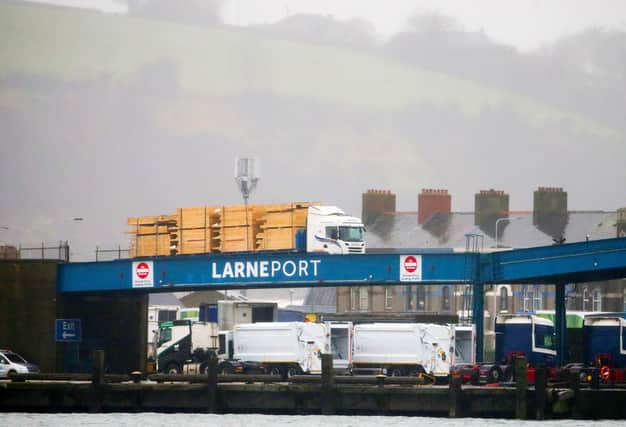Owen Polley: It will soon be impossible to ignore the flaws with the Windsor Framework


The House of Lords’ report repeatedly challenged the government to justify its claim that Rishi Sunak’s Brexit deal removed ‘any sense’ of an Irish Sea border. And it urged ministers to provide companies with more detail about how the trade arrangements, which are fast approaching, will work. This is only the latest evidence that discredits the framework, but it is perhaps some of the most detailed and significant.
The Sub-Committee on the Protocol on Ireland / Northern Ireland could not be described as pro- Brexit, or unionist. It contains Lord Dodds, the DUP’s House of Lords’ leader, and Lord Empey, former Ulster Unionist supremo, but the Irish nationalists Baroness O’Loan and Baroness Ritchie are also members. And there are more remainers on the panel than supporters of Brexit.
Advertisement
Hide AdAdvertisement
Hide AdMuch of the coverage of the Lords’ report implied that it said the framework was a ‘distinct’ improvement on the protocol, or that the deal had “no fundamental problems”. If you paid attention, though, these conclusions were not included in the text, but came from an interview with the sub-committee’s chairman, crossbench peer Lord Jay. That was his interpretation, but the view of another of the report’s authors, Lord Dodds, was that it showed that the framework, “represents the embedding of the Irish Sea border to a greater extent than anything we have seen thus far”. He said it “renders us worse off” than the status quo, and “creates greater checks and barriers to trade with the rest of the UK” (see link below).
It’s true that the report described the framework as an ‘improvement’, though certainly not a ‘distinct improvement’, on the protocol. That’s not surprising, given the make-up of the committee, some of whom, the text points out, are staunch supporters of the agreement. It’s striking, though, that the many problems flagged up by the report are supported by detailed evidence, based on the practical problems businesses expect to face.
The idea that the framework is an improvement was backed up by much more theoretical arguments, often articulated by lobbyists and academics who previously advised us that the protocol offered ‘the best of both worlds’. As the report put it, “Business representatives and stakeholders have welcomed the agreement of the UK and the EU of a mutually agreed solution, and the potential this provides for problems that arise in the future to be resolved in a collaborative manner.”
The weight of commentary about Brexit negotiations since 2016 has been saturated with these ‘it’s good to agree something ... anything’ type assumptions. And in Northern Ireland, they’re like a collective neural malfunction, peaking at times when our many crises and impasses are followed by all-party talks. The framework, in fact, offered almost no sign that the EU is easing up on its ambitions to control and restrict our economy, by imposing barriers between this province and the rest of the UK. The University of Ulster’s senior economist, Dr Esmond Birnie, emphasised this theme, as he reacted to the report last week.
Advertisement
Hide AdAdvertisement
Hide AdHe is astounded, for example, by how little attention has been paid to the large volume of goods from Great Britain that will have to go through the red lane. He believes that nearly all purchases for manufacturing, processing and resales will undergo full customs formalities, even though they come from “our main source of supplies”.
He asks, as well, why so few concerns have been raised about the cost to taxpayers of the government providing support for businesses, so that they can navigate the framework. It’s not clear either whether this money will eventually come from the Stormont block grant that we’re already told is so inadequate.
Dr Birnie warns that the new arrangements could mean Northern Ireland is “heading down the road to serfdom”, with the EU permanently in charge of important aspects of life here, rather than elected politicians at Stormont or Westminster. This message alluded to a book by the influential economist and philosopher, Friedrich Hayek, who warned that over-regulating the economy, like Brussels tends to do, would steadily erode people’s personal and social freedoms.
I’ve argued before that society is collectively looking the other way, as the framework’s implementation approaches. Opposition to the deal is portrayed as unreasonable or hardline, so people are either unaware of what is going to happen or don’t want to make a fuss about it.
Advertisement
Hide AdAdvertisement
Hide AdThe extraordinary thing about the Lords’ report was not that it reflected, in part, the increasingly threadbare received wisdom that the framework is positive, but that it recorded so forthrightly many of the problems that are looming in the autumn. In the national press, where protocol groupthink is less pronounced, most papers focussed immediately on its veiled criticisms of the government.
I’ve said it before, but, given the seriousness of the protocol / framework, the reaction from unionism has been moderate and even timid. Some pro-Union politicians actually downplay its significance or imply that it was inevitable due to Brexit. It’s no accident, though, that, as the implementation of the framework approaches, more organisations and businesses are expressing alarm. People who just wanted to ignore the whole fiasco will find that increasingly difficult, as the year progresses.